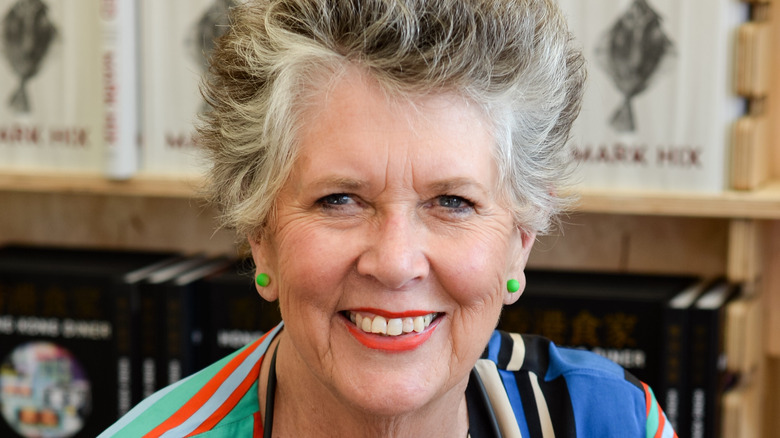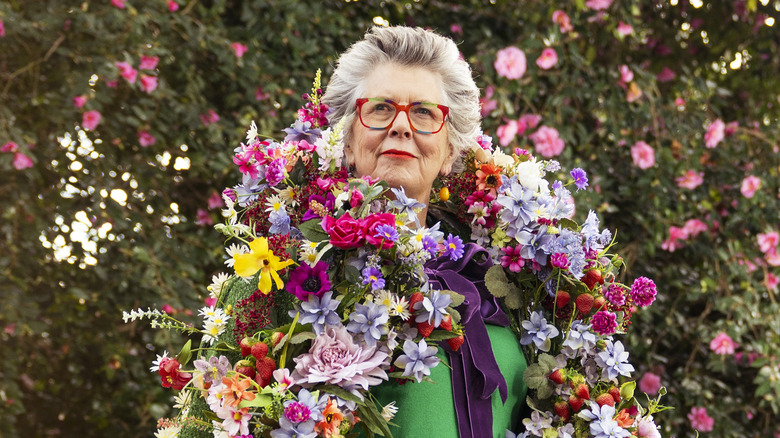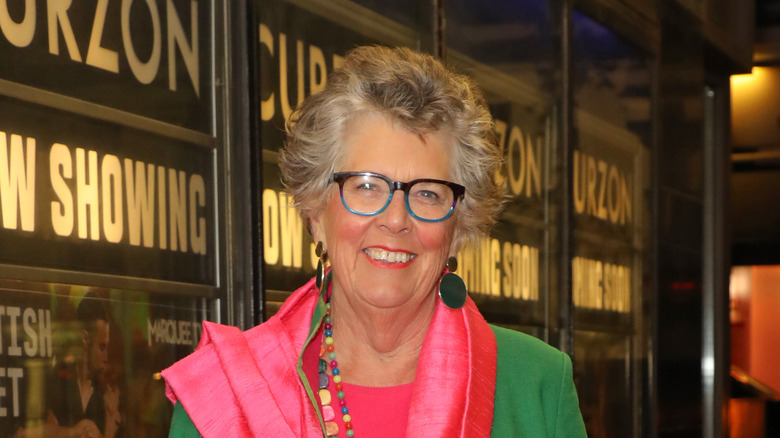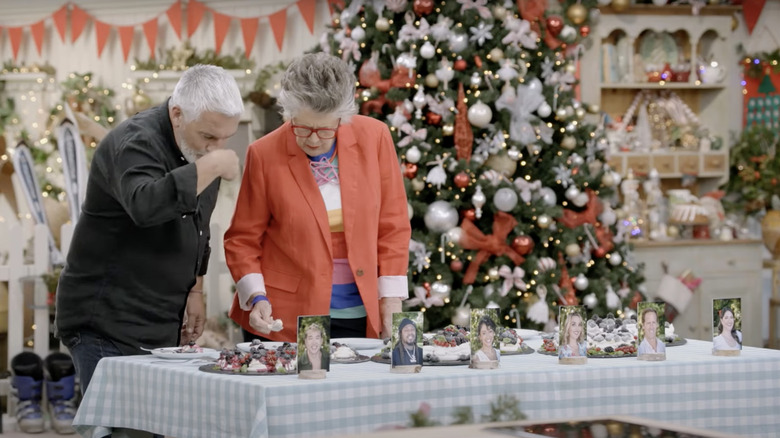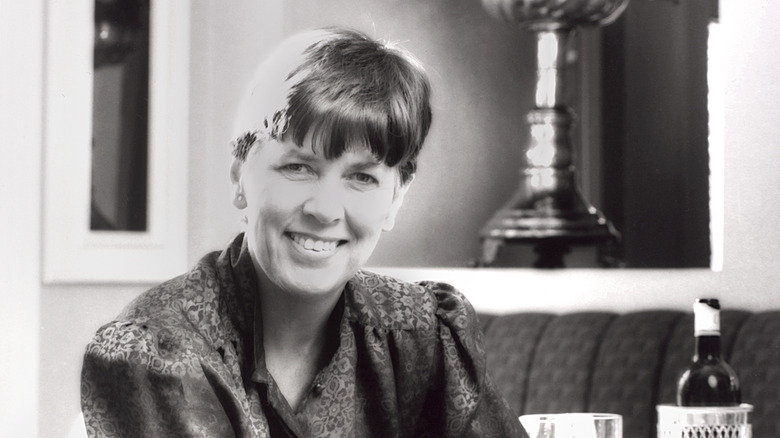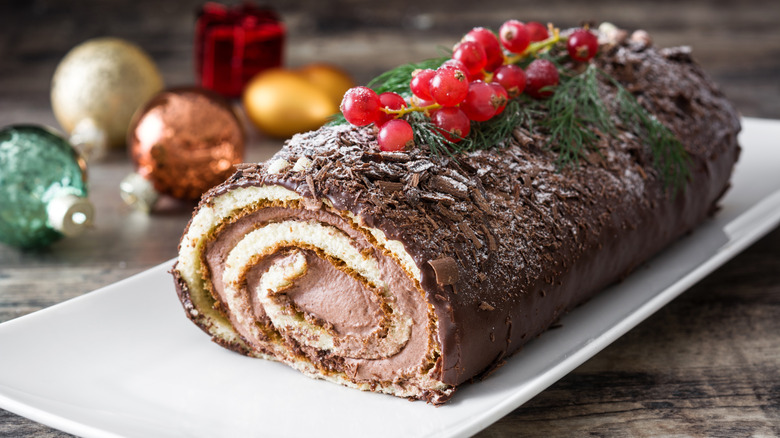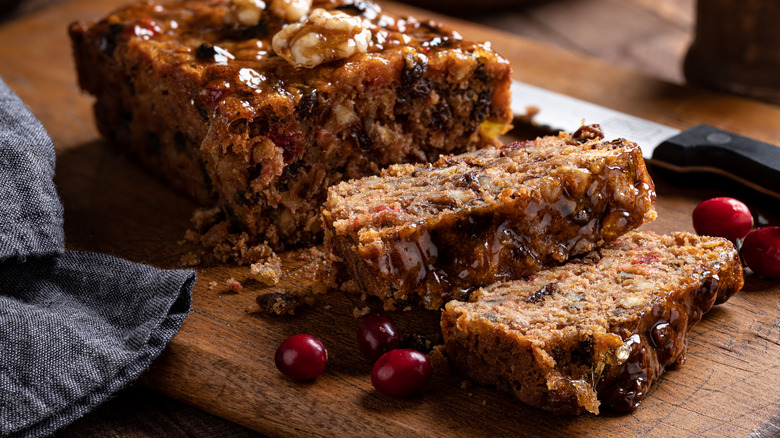Prue Leith Of Bake Off Discusses Christmastime Baking Tips And Stories - Exclusive Interview
The many, many fans of "The Great British Bake Off" know Prue Leith as one of the show's judges alongside Paul Hollywood. Her impeccable style, deep knowlege of all things pastry, and role as the slightly-less-intimidating judge have made her beloved, but her "Bake Off" career is just a small portion of her impressive résumé. The South Africa-born Leith has been one of Britain's foremost culinary authorities for decades, and her expertise goes far beyond desserts. She earned Michelin stars for her restaurant, Leiths, and she opened a culinary school as well. Her invaluable contributions to British food culture have earned her the titles Officer of the Order of the British Empire and Commander of the Order of the British Empire, so that's right: She's Dame Prue Leith to you.
Dame Leith has graced American shores to film "The Great American Baking Show: Celebrity Holiday Special" for The Roku Channel. She judged the efforts of American celebs like NFL great Marshawn Lynch and comedian, actor, and filmmaker Joel Kim Booster. In an exclusive interview with Tasting Table, Leith talked about filming the special and shared some Christmas baking wisdom.
Working with celebrities for the special
In the celebrity special, Joel Kim Booster said he thought you were the scariest judge, not Paul. What did you think of that?
It's the first time anybody's ever said something like that, so I was rather surprised, and I wondered if he was really watching. Mind you, I suppose I can sometimes be a little too blunt. But Paul Hollywood's stare is the only scary thing about him. Everybody always says he's so intimidating. There is something quite mesmerizing about those blue eyes, especially when he doesn't speak and just looks at the camera, or at you, or at the baker. It's quite unnerving.
I'm much less scary because I gabble on. There's nothing scarier than somebody not saying anything, and you think, "What are they thinking?" Paul will often do it. Sometimes he does it to a baker, and he stares at them, and they think, "Oh, God, he's going to say something terrible." Then he sticks his hand out and gives them his handshake.
Speaking of chatting, it took some prodding, but D'Arcy Carden got you to say you loved her in the special. Do you feel like you bonded with the celebrity contestants?
We ended up getting on well together, but it's not surprising; they're on "Bake Off" probably because they watch it and love it and think it will be fun to be in the tent. They're not there because they think they're going to win, because most of them, to be blunt, can't bake — not very well.
The extraordinary thing is because the recipes are good — and they do get an odd steer from me or Paul, and they're really trying — some of them can actually do it. The longer you're in the tent, the more you start to want to win. Those celebrities come in thinking, "We're going to have a good time; it's for fun." Then something grips them, and then they think, "Oh ..." They do something well, and they start thinking, "Maybe I could win this." They get competitive, and that's good fun.
The celebrities are surprisingly good bakers
Are you surprised at how well novice bakers can perform on the show?
I'm absolutely astonished at it. It's amazing. But it proves what I've always said: If you can read the recipe and do what you're told, you'll get on all right. The recipes are really good, and they do explain things pretty clearly.
On the technical, when they don't get much of a recipe, and they don't have any chance to think about it in advance, I'm amazed at how well the celebrities do. It is true; we don't make the tasks quite as difficult for the celebrities as we do for the main bakers, because those are people who've been baking for years and years and care about it. We do make it a bit easier. [The celebrities are] more likely to get brownies and scones and cupcakes than they are on the main show.
You don't want to hang them out to dry completely.
No. We want them to enjoy it, and we want the audience to enjoy it. Nobody enjoys seeing people humiliated. That is one of the reasons that "Bake Off" is such a success — it's quite a kind show. It's not into humiliation and torture and victimization. It's about cooperation and kindness and so on.
What separates Bake Off from other reality shows
It is distinct from a lot of reality shows. Even Paul, who's ostensibly the tough judge, is a lot nicer than many reality show judges.
When they asked me if I'd like to judge "The Great American Baking Show," I was a little bit hesitant because I hadn't seen any American "Bake Off" programs, but I had seen a lot of American competitive shows, usually when they're competing to win a lot of money. The competitors and the judges were quite brutal, and the competitors would often undermine each other. Everybody was, very often, trying to hog the camera and put other people in a bad light. The spirit of the whole thing, from both judges and competitors, was rather distressing.
One of the joys of "Bake Off" is that it doesn't add stress to anybody's life. It's an oasis of calm, where you see people being kind to each other and cooperating and doing something that is talented and fascinating to watch. It's not stressful for the viewer. The viewer has enough stress in their lives — getting the kids to school, going straight off to work and coming back from work, collecting the kids from school, getting the supper on the table. It's all very stressful. "Bake Off" isn't like that. "Bake Off" is a little oasis of calm and kindness.
You don't need more stress on your TV.
No, you don't. My husband is worse than me; my husband won't watch anything that makes him unhappy. That means he won't watch some very good plays and very good series. He says, "Look, I don't pay to be made unhappy and come out of here crying." Neither of us likes violence or horror. "Bake Off" is fine.
Christmas in South Africa
You grew up in South Africa. Are there any Christmas traditions or baking traditions in South Africa that Americans should know about?
South Africa is quite a Christian country. The traditions of Christmas presents, and a Christmas tree, and a roast or something, having a special meal ... Whether you're Black or white, or from Dutch extraction or English extraction or French extraction, they're all pretty European, because they came with the missionaries.
In the Black communities, which tend to be more religious than the white ones, it's more about the birth of Christ and religion, whereas I grew up not in a religious family at all. The only difference between us and an English Christmas was that we would be having our turkey and plum pudding in the blazing summer. It was most unsuitable food for the middle of the summer, but we still did it because it was English. We'd have sherry on the lawn in the sunshine — sherry in the sunshine is great. Our Christmas tree was an apple tree that grew outside our house, and we used to put cotton wool balls on it to try and look as if it had snow on it, so traditional Christmas practices are rather corrupted.
Prue's Christmas baking advice
If someone with very little baking experience had to bring a dessert to a Christmas party, what would you recommend that they make?
It is a good idea to make what we call a Yule log. It's a Christmas cake, but it's not Christmas cake as you know it. To make a proper Christmas cake, it takes ages — lots of fruit, you need marzipan and decoration and icing, and it's a whole performance. But if you make a Yule log, it's basically a rolled-up sponge cake. I make it with a flourless sponge recipe, but you can make it with any chocolate sponge recipe.
Bake it in a Swiss roll tin like a flat sheet, then roll it up with lots of whipped cream inside. Then you put chocolate butter icing all over it and mark it with a fork to make it look like the bark of a log. It's very easy to do. Stick a piece of holly in the top, or any Christmas decoration — it could be fake if you like — and shake some icing sugar all over it, and it'll look like a Christmas log. It's absolutely delicious.
It takes about ... Well, if you bake the thing, that might take an hour altogether, and another 10 minutes to decorate it. It's not a big performance. If you can buy a good log-shaped rolled chocolate cake, why not? As long as the product is good, I have no problem with people buying stuff — although I would rather you baked it, and I'd rather you use my recipe.
Fruitcake for people who don't like fruitcake
In the States, fruitcake is a running joke. Lots of people claim they hate it, and it has a reputation as something that's kind of stodgy. Do you have any particular types of fruitcake you'd recommend or anything you'd say to the fruitcake haters to be a little more open-minded?
Funnily enough, I like all kinds of fruitcake. I like the really solid kind, which would probably be the stodgiest. The Italians have a thing that they call panforte, which is basically pressed fruit. It doesn't have any cake in it; it's just squashed together. It's a confectionary, but it's called panforte, which means "strong bread."
I make a Christmas cake. It's an ordinary cake recipe with lots of fruit in it, dried fruit, but I make it with all white or light dried fruits — sultanas rather than raisins, and pineapple, and apricot — all light-colored fruit. The light-colored fruit tends to be a bit more acidic and less sweet, and that makes it delicious for fruitcake haters. They might still not like the fruit at all, but it's the best kind of fruitcake for them because it's not too heavy and it's not stodgy at all.
You can watch "The Great American Baking Show: Celebrity Holiday Special" now on The Roku Channel.
This interview has been edited for clarity.
